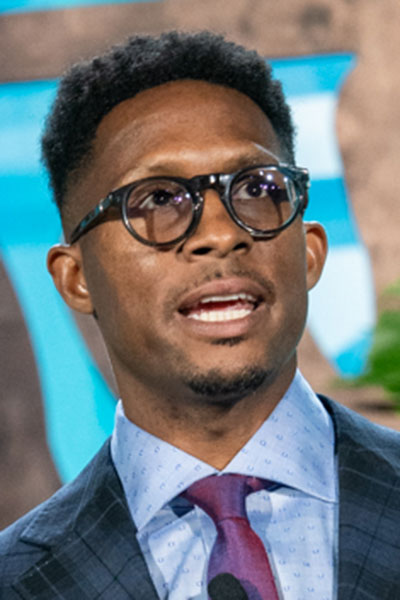The path forward for the medical profession is through communication, which is not simply the transmission of information, according to Cedric “Jamie” Rutland, MD, FCCP, who delivered the keynote presentation, “Diversifying the Application of Medical Knowledge,” during Sunday’s Opening Session.
“The goal is to connect dots, not collect them,” said Dr. Rutland, a practicing pulmonary and critical care physician, communicator, and educator.
For many, the term “diversity” conjures ideals of cooperation among people of different races, ethnicities, genders, and religions.

“For me, diversity in medicine is so much more than that,” Dr. Rutland said. “It’s beyond the bedside. It’s beyond the clinic. It’s beyond those white hospital halls that we’re always walking down.”
Patients today demand explanations, he continued. And when explanations aren’t forthcoming, misinformation quickly fills the void, amplifying the need for diversity in medicine.
“Diversifying medicine is finding new, creative ways to take the years of our education and experience and communicate this knowledge to the public—all of the public—because the more we all know, the better we all do,” Dr. Rutland said.
Since receiving diagnoses of ADHD, ADD, dyslexia, and dysnomia while in medical school, Dr. Rutland harnessed what he considers his inborn gifts for communication and education as a clinician and as a content creator via his YouTube channel, Medicine Deconstructed.
“Immunology became my love. All the cytokines and chemokines released made sense to me. White blood cell recruitment, or just cell recruitment in general, it made sense,” he said. “It was like the body making a bunch of phone calls and giving instructions, which led to patient symptoms. So, I applied this, and I kept applying this.”
As he continued to connect the dots and learned to explain cell communication more effectively, his interest in pathologies expanded from interstitial lung disease (ILD) to idiopathic pulmonary fibrosis to the immunology of asthma, pulmonary hypertension, ILD, and bronchiectasis. These topics are regularly featured on Medicine Deconstructed.
Dr. Rutland credits witnessing his grandparents’ health challenges and his experiences with his own neurodiversity with his understanding of the need for diverse forms of communication between health care providers and their patients.
“Concise, visual, entertaining delivery of information was necessary, and it’s how I educate. This is how I effectively communicate with all patients,” he said. “Yes, those who think and look like me, but also those who are culturally, ethnically, educationally, spiritually—all the ways you can think of—different from me.”
Clinicians must be mindful of the roadblocks that stereotypes pose to effective communication with patients.
“[A stereotype] is an assumption that’s not always wrong, but it cuts off your ability to look deeper, to see someone as themselves, independent from all stereotypes and preconceived notions, to see a person’s whole, unique story,” Dr. Rutland said.
He has an instinctive knack for knowing how to communicate with patients.
“Patients who have had horrible experiences with doctors, some will be anxious, scared, dismissive, even combative,” he said. “But we need to offer them an olive branch, to try and connect, because this isn’t their fault this happened. And it’s our job to communicate to them in a way that gives them a sense of caring. They matter, and they have control of their decisions.”
CHEST’s First 5 Minutes® program quickly and effectively provides evidence-based skills that build trust and open communication with your patients. Experience and feedback tell us patients follow medical instructions and have better long-term health outcomes when they feel understood. Learn how small practice changes lead to better results.
Join us at CHEST 2025
Save the date for the next Annual Meeting, October 19 to 22, 2025, in Chicago. CHEST 2025 will explore the latest advancements in pulmonary, critical care, and sleep medicine, with a focus on innovation and the future, just as the city itself embodies progress and reinvention.





